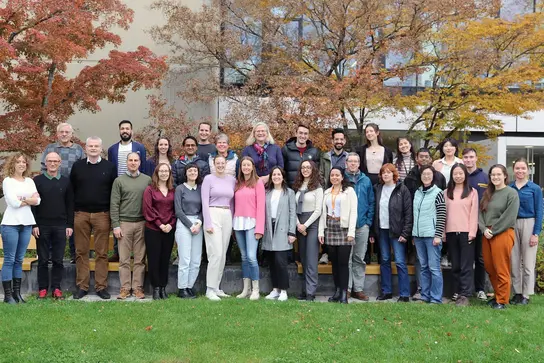Epigenomik
- Funktionelle und Strukturelle Genomforschung

Prof. Dr. Christoph Plass
Abteilungsleiter
Unsere Abteilung erforscht den Beitrag epigenetischer Veränderungen zu Krebs, von der Frage, wie epigenetische Veränderungen das Tumorwachstum fördern, bis hin zur Frage, wie sie Krebstherapien beeinflussen. Nicht-genetische Mechanismen der Therapieresistenz sind auf molekularer Ebene nur unzureichend verstanden und stellen einen ungedeckten klinischen Bedarf dar, den wir in verschiedenen Projekten angehen wollen.

Unsere Forschung
Die Abteilung für Krebsepigenomik konzentriert sich auf die Integration von epigenomischen, genetischen und transkriptomischen Daten, um epigenomische Veränderungen zu entschlüsseln, die zu bösartigen Erkrankungen des Menschen beitragen, wobei der Schwerpunkt auf akuter myeloischer Leukämie, chronischer lymphatischer Leukämie, Brust-, Lungen- und Prostatakrebs liegt. Eine veränderte epigenetische Regulierung der Genexpression durch Veränderungen der DNA-Methylierungsmuster, der Histonmodifikationen und der Positionierung der Nukleosomen wurde als tumorigener Mechanismus bei fast allen bösartigen Erkrankungen des Menschen identifiziert. Die epigenetische Genregulation durch Modulation der Enhancer-Aktivität wird heute als neues Konzept in der Krebsepigenomik anerkannt. Epigenetische Modifikationen verändern nicht die Gensequenz und bieten die vielversprechende Möglichkeit, sie durch Hemmstoffe epigenetischer Enzyme rückgängig zu machen. Unsere Arbeit stützt sich auf den Einsatz modernster Technologien, einschließlich genomweiter epigenomischer Profilerstellung gereinigter Zelltypen unter Verwendung von Low-Input-Protokollen, Einzelzelltechnologien, Long-Read-Sequenzierung und hochentwickelter computergestützter Analysen von Omics-Daten.
Die weiterführenden Seiten sind derzeit nur auf Englisch verfügbar.
Team leader
- Profil anzeigen

Prof. Dr. Christoph Plass
Abteilungsleiter
- Profil anzeigen

Dr. Clarissa Gerhäuser
Team Leader Epigenomics of hormone-driven Cancer
- Profil anzeigen

Dr. Maria Llamazares Prada
Team Leader Lung Cancer Epigenomics
- Profil anzeigen

Dr. Michael Scherer
Team Leader Computational and Single-Cell Epigenomics
B370 team

Methoden
Ausgewählte Publikationen
Guokun Zhang, Vindi Jurinovic, Stephan Bartels, Matthias Christgen, Henriette Christgen, Leonie Donata Kandt, Lidiya Mishieva, Hua Ni, Mieke Raap, Janin Klein, Anna-Lena Katzke, Winfried Hofmann, Doris Steinemann, Ronald E. Kates, Oleg Gluz, Monika Graeser, Sherko Kuemmel, Ulrike Nitz, Christoph Plass, Ulrich Lehmann, Christine zu Eulenburg, Ulrich Mansmann, Clarissa Gerhauser, Nadia Harbeck, Hans H. Kreipe
Etienne Sollier, Anna Riedel, Umut H. Toprak, Justyna A. Wierzbinska, Dieter Weichenhan, Jan Philipp Schmid, Mariam Hakobyan, Aurore Touzart, Ekaterina Jahn, Binje Vick, Fiona Brown-Burke, Katherine Kelly, Simge Kelekçi, Anastasija Pejkovska, Ashish Goyal, Marion Bähr, Kersten Breuer, Mei-Ju May Chen, Maria Llamazares-Prada, Mark Hartmann, Maximilian Schönung, Nadia Correia, Andreas Trumpp, Yomn Abdullah, Ursula Klingmüller, Sadaf S. Mughal, Benedikt Brors, Frank Westermann, Elias Ulrich, Robert J. Autry, Matthias Schlesner, Sebastian Vosberg, Tobias Herold, Philipp A. Greif, Dietmar Pfeifer, Michael Lübbert, Thomas Fischer, Florian H. Heidel, Claudia Gebhard, Wencke Walter, Torsten Haferlach, Ann-Kathrin Eisfeld, Krzysztof Mrózek, Deedra Nicolet, Lars Bullinger, Leonie Smeenk, Claudia Erpelinck-Verschueren, Roger Mulet-Lazaro, Ruud Delwel, Aurélie Ernst, Michael Scherer, Pavlo Lutsik, Irmela Jeremias, Konstanze Döhner, Hartmut Döhner, Daniel B. Lipka, Christoph Plass
Michael Scherer, Indranil Singh, Martina Maria Braun, Chelsea Szu-Tu, Pedro Sanchez Sanchez, Dominik Lindenhofer, Niels Asger Jakobsen, Verena Körber, Michael Kardorff, Lena Nitsch, Pauline Kautz, Julia Rühle, Agostina Bianchi, Luca Cozzuto, Robert Frömel, Sergi Beneyto-Calabuig, Caleb Lareau, Ansuman T. Satpathy, Renée Beekman, Lars M. Steinmetz, Simon Raffel, Leif S. Ludwig, Paresh Vyas, Alejo Rodriguez-Fraticelli & Lars Velten
Katherine Kelly, Michael Scherer, Martina Maria Braun, Pavlo Lutsik & Christoph Plass
Kontaktieren Sie uns
